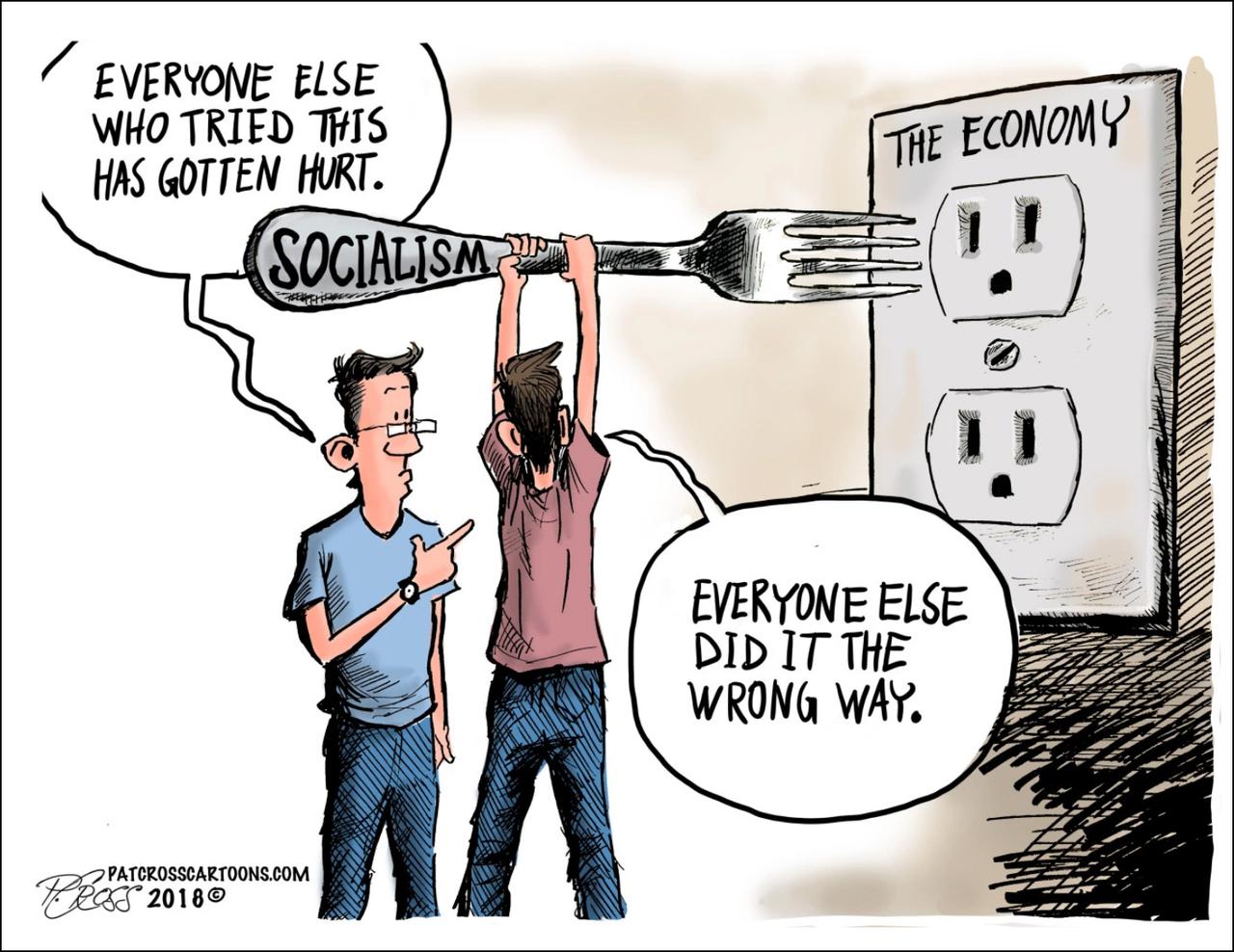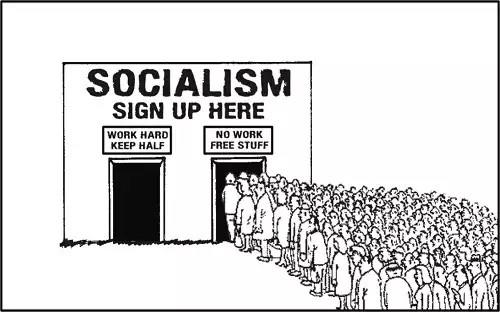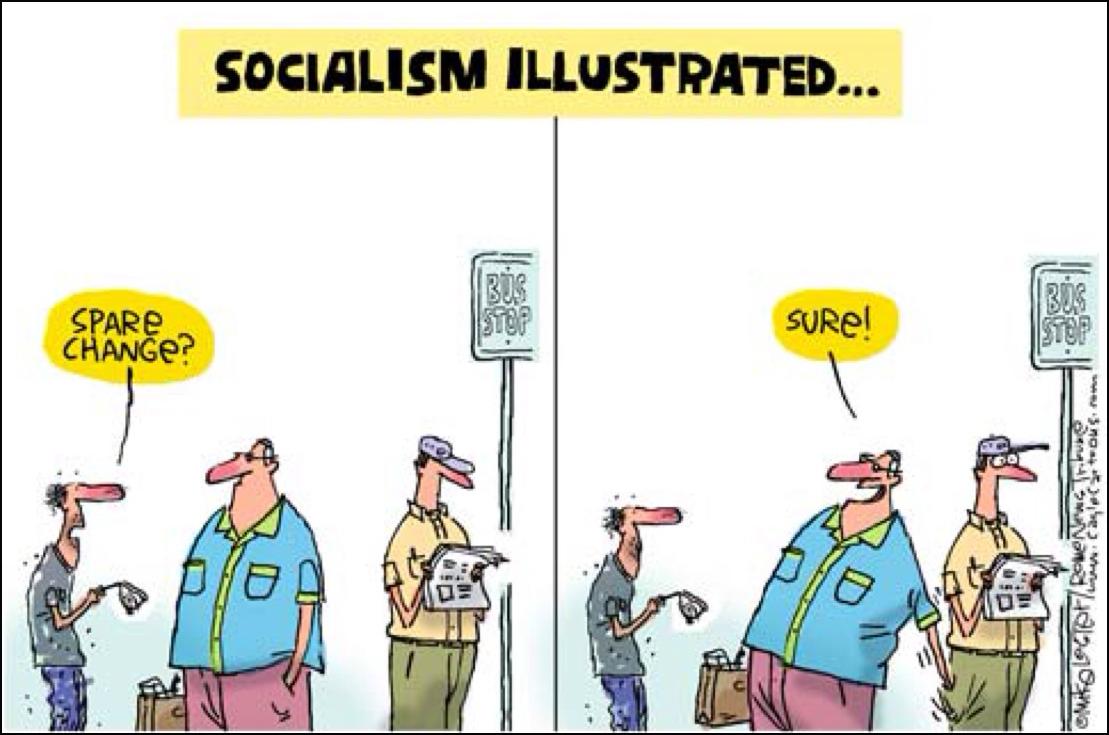Authored by Gary Galles via The Mises Institute,
With all the “turn that over to the government, too, so someone else will have to provide it for you” proposals that have come from Democrat Presidential hopefuls already, candidates are actually being asked if they are a “socialist” or a “capitalist.”
Bernie Sanders, who has called for “economic rights” guarantees to be treated as Constitutional rights, admits being a socialist.
Representative Alexandria Ocasio-Cortez, who may want even more people to live at everyone else’s expense, is on the same bandwagon: “Capitalism is an ideology of capital–the most important thing is the concentration of capital and to seek and maximize profit.” Consequently, “capitalism is irredeemable.”
However, other candidates, proposing or supporting very similar changes, have claimed they are (modified) capitalists.
Elizabeth Warren has said “I am a capitalist to my bones…I believe in markets. What I don’t believe in is theft.” Along the same lines, she has said, “I love what markets can do. I love what functioning economies can do. They are what make us rich; they are what create opportunity. But only fair markets, markets with rules. Markets without rules is about the rich take it all…And that’s what’s gone wrong in America.”
Kamala Harris offered a similar complaint that “the rules aren’t applying equally to all people.”
Joe Biden asked, “What happened to a moral responsibility, to a moral capitalism?”
Beto O’Rourke followed up his claim to be a capitalist with “Having said that, it is clearly an imperfect, unfair, unjust and racist capitalist economy.”
Unfortunately for these candidates (and for Americans if voters don’t understand better), every one relies on false assumptions about markets and governments.
Senator Sanders fails to see that his call for more positive rights to things, from education to health care, must violate Americans’ negative rights (prohibitions laid out against others, especially government, to prevent unwanted intrusions). The Declaration of Independence, echoing John Locke, asserts that all have unalienable rights, including liberty, and that our government’s central purpose is to defend those negative rights, which is further reinforced in our Bill of Rights. Each citizen can enjoy them without infringing on anyone else’s rights. Negative rights impose on others only the obligation not to invade or interfere. But when the government creates new positive rights, extracting the resources to pay for them necessarily takes away others’ unalienable rights. That is, you cannot add new positive rights to existing negative rights, you can only do so by destroying some of the negative rights that define the idea that became America.
AOC, as she is now typically called, shows that she “learned” things that contradict what she should have learned in her economics major. She subscribes to what Marx intended in naming capitalism – making it seem that the owners of capital gain and others are hurt. But capitalism is better defined as a system of private ownership of resources, including one’s labor, not simply ownership of capital, coordinated by solely voluntary arrangements. Private property prevents the physical invasion of a person’s life, their liberty, or their property without their consent. By preventing such invasions, private property is an irreplaceable defense against aggression by the strong against the weak. No one is allowed to be a predator by violating others’ rights. In such a system, capitalists need the voluntary consent of laborers in their arrangements, preventing capitalists from exploiting laborers. In Herbert Spencer’s words, “far from being, as some have alleged, an advocacy of the claims of the strong against the weak, [capitalism] is much more an insistence that the weak shall be guarded against the strong.”
Elizabeth Warren’s supposed endorsement of markets, but opposition to markets without rules is senseless. There are no markets without rules in capitalism. The core rule is that of private property, which requires arrangements to be voluntary, which in turn rules out the possibility of the theft she supposedly objects to. If there is theft, or fraud that allows it, that represents a government failure to defend someone’s property rights or a piecemeal violation of equal property rights by government, neither of which justifies still more government intervention to fix, unless it is to better defend private property rights now being violated or stop violating them itself. And Kamala Harris’ complaint that “the rules aren’t applying equally to all people” is subject to the same criticism.
Joe Biden’s “What happened to a moral responsibility, to a moral capitalism?” reflects a similar confusion. The most basic moral or ethical basis for any human relationship is to not violate others’ rights, which Cicero called “giving each his own,” over two millenia ago. Or, as Adam Smith wrote in his Theory of Moral Sentiments, “The man who barely abstains from violating either the person, or the estate, or the reputation of his neighbors…does everything which his equals can with propriety force him to do, or which they can punish him for not doing. We can often fulfill all the rules of justice by sitting still and doing nothing.” Yet Biden seems to think that policies that require the violation of unwilling Americans’ rights is more moral than one that does not.
Beto O’Rourke’s endorsement of capitalism, then described as “imperfect, unfair, unjust and racist,” seems to reflect a similar view, but mainly reflects serious confusion. What American would endorse something that meets his description of capitalism, unless he was a sadist?
For each of these candidates, even a rudimentary understanding of private property rights and voluntary arrangements eviscerates their evaluations of capitalism, and sweeps away any reliable basis for their proposed “solutions.”
In fact, both logic and history attest to the damage their proposals can create. As Ludwig von Mises explained it, private property is the basis for “joint action and cooperation in which each participant sees the other partner’s success as a means for the attainment of his own,” in sharp contrast to any “us versus them” zero- or negative-sum view of social interaction which treats someone’s gains as others’ losses. In capitalism (which is actually inconsistent with the government- created or enabled crony capitalism we see all around us), even those who would be tyrants, if given the opportunity, must focus their efforts on providing willing service to others to induce their voluntary cooperation. In contrast, the drive for power that animates these politicians who condemn a capitalism they plainly don’t comprehend would increasingly turn others into their unwilling servants.
via ZeroHedge News http://bit.ly/2FZ1LbB Tyler Durden



